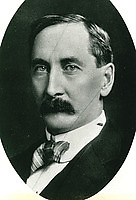|
| Affiliation | Republican |

|
| |
1902-01-01 |
|
|
| Name | Nathan C. Miller |
| Address |
Durango, Colorado , United States |
| Email | None |
| Website | None |
| Born |
00, 1859
(165 years)
|
| Contributor | BrentinCO |
| Last Modifed | BrentinCO
Apr 13, 2018 09:56pm |
| Tags |
|
| Info | In 1902, Colorado voters amended the state’s constitution to allow any town of over 2,000 people to become a “home rule” city. Denver was the first to do so. The winner of the 1902 Attorney General’s race was Nathan C. Miller of Durango. Miller, a Republican, defeated Democrat John C. Schweigert and four minor party candidates, including Charles Post. His salary as Attorney General was $3,000 per year. Miller had three Assistants, Henry Hersey, I. B. Melville and a Mr. Waldron. He commended the state for the “commodious and respectable quarters” provided to him and his Assistants in the State Capitol Building.
Nathan Miller was born on a farm in Carroll County, Illinois in 1859. He attended public schools and graduated from Northwestern University in 1888. After teaching school for three years, he studied at the Chicago Law School and was admitted to the bar. After moving to Durango, Colorado in 1889, he served four years as District Attorney of the Sixth Judicial District. He also served as City Attorney for Durango. He was a fusion candidate for Governor in 1896, but was handily defeated.
During his first term as Attorney General, Miller litigated the constitutionality of a new liquor license law, annual corporate license tax and the state inheritance tax. He also defended a Colorado law taxing the capital value of all railroad stock, not just assets operating in Colorado. He also spent time doing what virtually all his successors would do, defending claims against Colorado brought by Kansas alleging improper diversion from the Arkansas River. Finally, he wrote a short but interesting formal opinion on the use of the state militia to suppress “insurrections” in Teller and San Miguel Counties.
In 1903 and 1904 labor strikes by miners resulted in considerable violence in Colorado. Cripple Creek became an armed camp when 3,500 miners were idled. Colorado Governor James Peabody sided with the mine owners and utilized the state militia in an attempt to suppress the violence. The situation literally exploded on June 6, 1904, when a union terrorist named Harry Orchard dynamited a railroad station in Teller County, killing thirteen strike-breaking miners. Orchard would kill three more people in bombing incidents in the West before being captured and sentenced to death in Idaho. The bombing brought an end to the strike. Attorney General Miller sanctioned the Governor’s declaration of martial law and the use of both the state militia and law enforcement to expel several hundred union sympathizers from the mining district.
In 1903 Denver established one of the first juvenile courts in the country and Ben Lindsay became the first Juvenile Judge.
Nathan Miller was reelected in November of 1904. His Assistants were W. R. Ramsey, I. B. Melville and Calvin Reed. In his report to the Governor, Miller indicated the office was devoting “an immense amount of labor” to efforts to collect inheritance tax and highlighted the judgment against the estate of Winfield Scott Stratton, the most prominent rags-to-riches millionaire in the Cripple Creek gold fields. The judgment for $284,000 plus $76,000 in interest was enormous at the time.
Antitrust laws were being enacted on the federal level, and Miller urged the adoption of state laws regarding trusts and “unlawful combinations.” The Kansas v. Colorado water case was set for argument before the U. S. Supreme Court. Miller suggested the state’s District Attorneys should handle their own cases in the Colorado Supreme Court. Finally Miller wrote a formal opinion holding that a recent act of Congress precluded county courts from naturalizing U. S. citizens. That was now the exclusive province of the federal courts.
In 1905 the Colorado legislature formally authorized the Attorney General to appoint a deputy attorney general to be second in charge in the office. The year was also one of great political intrigue in Colorado. In a matter of 24 hours the state had three Governors. It appeared Democrat Alva Adams had been elected for a third time. But voter fraud allegations caused Republican James Peabody to be installed. Then fraud allegations against him caused the Lieutenant Governor, Republican Jesse McDonald, to assume the office.
[Link] |
 | BOOKS |
 |
|
| Title |
Purchase |
Contributor |
|
| Start Date |
End Date |
Type |
Title |
Contributor |
|
| Date |
Category |
Headline |
Article |
Contributor |
|
 | INFORMATION LINKS |
|
|
|

